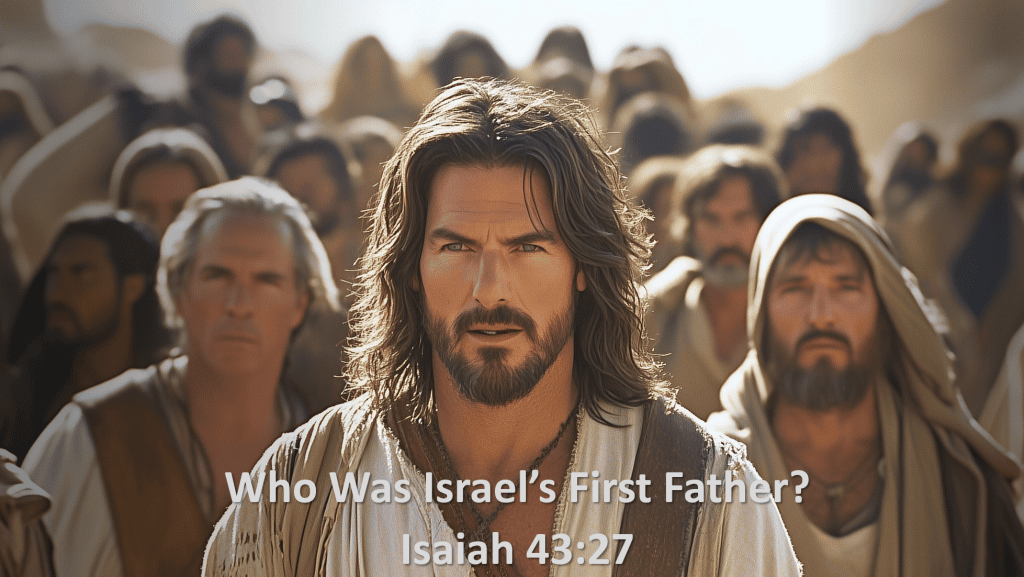The Sins of the First Father
Copyright © Robert E. Cruickshank, Jr (December 30, 2024)
Wells McBogtash (Editor)
All Rights Reserved
“Your first father sinned, and your spokesmen have rebelled against Me. So I will profane the officials of the sanctuary, and I will turn Jacob over to destruction and Israel to abuse” (Isaiah 43:27-28).
These verses preface Isaiah’s polemic against Idolatry in chapter 44. The reference to the sin of their first father (Isa. 43:27) sets the stage for the material that follows. This ancestral sin would plague the generations to come. The question is: who was Israel’s first father, and what was his sin?
Some have tried to trace it all the way back to the father of humanity himself, namely, Adam and his disobedience in the garden. But this doesn’t fit Isaiah’s context nor the context of the Bible overall. There are numerous Biblical narratives reviewing Israel’s history, and of which are unanimous in tracing the nation’s lineage back to Abraham – and not Adam. Humanity’s identity as a whole loops back to Adam, but Israel’s identity as a nation, specifically, does not.
In Luke 1:73, Abraham is singled out as the father of the nation of Israel. Accordingly, the Jews of Jesus’s day considered Abraham to be their Father (Jn. 8:53). As did Stephen, who speaks of “our father Abraham” (Acts 7:2). Paul likewise refers to Abraham “who is the father of us all” (Rom. 4:16), and James identifies “Abraham our father” (Js. 2:2). The NT writers’ perception of Abraham as the progenitor of their nation is rooted in OT texts which say the same, none of which take Israel’s national ancestry back to Adam.
The rededication prayer of the Levities in Nehemiah 9 is especially pertinent, since the creation account is recited (Neh. 9:5-6). Yet, there is no mention of Adam, a covenant with him, nor his sin. Israel’s history starts with Abraham and the covenant made with him (Neh. 9:7-8). The Levites had every opportunity to bring Adam into the picture when retracing their history. They didn’t. As with the NT passages, it begins with Abraham. And Isaiah himself says unequivocally: “Look to Abraham your father, and to Sarah who gave you birth in pain” (Isa. 51:2).
The ancestral sin that Isaiah speaks of, however, takes us back a generation before Father Abraham. The prophet refers to Israel’s “first father” – the key word here being “first” (ri’ shon), meaning “former or previous” in a context like this. For example, consider its usage in the following passages:
“the former(ri’ shon) famine” (Gen. 26:1), “the previous (ri’ shon) period” (Num. 6:12), “the former (ri’ shon) king of Moab” (Num. 21:26), “her former (ri’ shon) husband” (Deut. 34:4), “former (ri’ shon) afflictions” (2 Sam. 7:10), “former (ri’ shon) times” (2 Sam. 20:18), “two former (ri’ shon) captains of fifty” (2 Kg. 1:14), “former (ri’ shon) manner” (2 Kg. 17:34,40), “the former (ri’ shon) governors” (Neh. 5:15), “former (ri’ shon) ages” (Job 8:8), “former (ri’ shon) iniquities” (Ps. 79:8), “former (ri’ shon) time” (Isa. 9:1), “former (ri’ shon) things” (Isa. 41:22), “former (ri’ shon) kings” (Jer. 34:5), “former (ri’ shon) words” (Jer. 36:28), “former (ri’ shon) glory” (Hag. 2:9), “former (ri’ shon) prophets” (Zech. 7:7), “former (ri’ shon) days” (Zech. 8:11), etc. So, Isaiah is speaking of the sin of their ”former (ri’ shon) father.” In other words, their father prior to Abraham.
So, Isaiah is speaking of the sin of their “former (ri’ shon) father.” In other words, it’s their father prior to Abraham. The question is: who was their father prior to Abraham, and how does this fit Isaiah’s context regarding the sin of idolatry?
To unlock the meaning of Isaiah’s words, we must go back further than Abraham. We must back up further in the Biblical narrative. We must go all the way back to the book of Joshua. Like the other recitations of Israel’s history, Joshua speaks of “your father Abraham” (Josh. 24:3), but he backs up one more generation and includes Abraham’s own father as well:
“Joshua said to all the people, This is what the Lord, the God of Israel says: ‘From ancient times your fathers lived beyond the Euphrates River, namely, Terah, the father of Abraham and the father of Nahor, and they served other gods’” (Josh. 24:2).
Notice the indictment: Abraham’s fathers are also their fathers. Next, notice Joshua’s ultimatum, referring specifically to the idolatry of their fathers:
“Now, therefore, fear the Lord and serve Him in sincerity and truth; and do away with the gods which your fathers served beyond the Euphrates River and in Egypt, and serve the Lord” (Josh. 24:14).
Isreal’s “former father,” their “first father,” was Abraham’s father, Terah, and he worshipped false gods. The Israelites of Joshua’s day were worshiping those same false gods (Josh. 24:15). And the Israelites of Isaiah’s own day were still doing the very same thing. Isaiah’s reference to their “first” or “former” father loops back to Joshua’s context and makes sense out of his own context.
Isaiah 43:27 does not import Adam into Isaiah’s context, nor does it remove Adam from history’s context. All humans descend from Adam (Acts 17:26), and Eve is the mother of all the living (Gen. 3:20). Abraham was the father of Israel, and Terah was Israel’s “first father.” The Israelites’ sin was the same as Terah’s. Old habits die hard, but old Adam has nothing to do with it in this regard.


